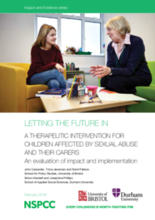Displaying 1001 - 1010 of 1177
UK Prime Minister David Cameron has announced the government’s plans to pass new laws to encourage adoption of children in care, among other things, “even when that means overriding family ties", he wrote.
In this piece for the Huffington Post Blog, Phil Smith, an adoptive father, writes about his and his wife’s experience with a program Concurrent Planning, run by a specialist team in London, UK.
Research from the Howard League for Penal Reform suggests that children in care in the UK are more likely to be criminalized, and to come into contact with the criminal justice system, particularly children in residential care homes, according to this article from the Guardian.
This article draws on Giorgio Agamben's (1995) theory of 'bare life' to examine the identity and the political positioning of child welfare-involved mothers in contemporary Western child protection systems to complement the primary focus on their children.
In this episode of “File on 4” from BBC Radio, Jane Deith investigates the practice of “Special Guardianship” orders in the UK, orders that grant legal guardianship of children to relatives or others who come forward to care for children when their parents can’t.
This paper reports selected results from a mapping review of research conducted in the UK and published between January 2010 and December 2014. The purpose of the review was twofold: to develop a typology of child protection research; and to use this typology to describe the features and patterns of empirical research undertaken recently in the UK in order to inform a future research agenda.
This independent report, from University of Bristol and Durham University, draws on information from the largest randomised controlled trial of a service for children affected by sexual abuse.
This paper presents findings from a qualitative study exploring the views of 26 children, aged 6–17 years, about their participation in the child protection system in England.
This paper builds on a recent evaluation of the piloting of the continental European model of social pedagogy (SP) in English residential care. It does three things: it considers the theoretical social policy literature on policy transfer and its implications; discusses European residential care for children and the discipline of SP; and reflects on these debates and the situation of children's residential care in England.
This paper uses findings from interviews with 169 children and young people across 11 local authorities in England and 5 Social Work Practices (SWPs), undertaken as part of a 3-year national matched control evaluation of pilot SWPs, to identify key elements of good quality practitioner relationships with children or young people.

